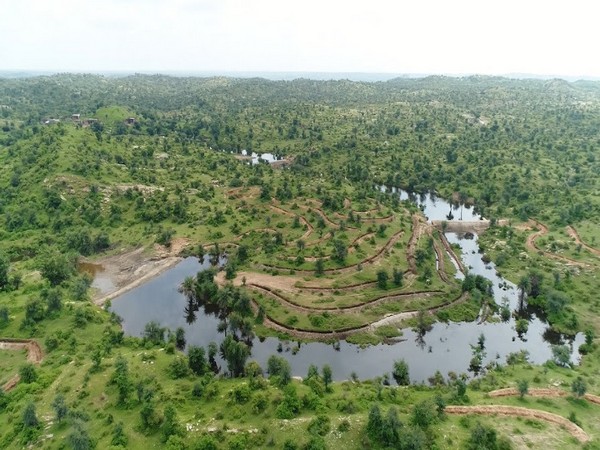DS Group's water conservation initiatives focus on long term water sustainability
The Dharampal Satyapal Group (DS Group) has been working in the water stressed areas of the country to ensure long term availability of water through geographic-specific conservation measures and judicial utilization of resources. The Group supports multiple water conservation and replenishing projects across Rajasthan, Madhya Pradesh, Uttar Pradesh, Himachal Pradesh, Uttarakhand and Gujarat, benefitting millions of people from the marginalized communities.

- Country:
- India
New Delhi [India], September 15 (ANI/NewsVoir): The Dharampal Satyapal Group (DS Group) has been working in the water stressed areas of the country to ensure long term availability of water through geographic-specific conservation measures and judicial utilization of resources. The Group supports multiple water conservation and replenishing projects across Rajasthan, Madhya Pradesh, Uttar Pradesh, Himachal Pradesh, Uttarakhand and Gujarat, benefitting millions of people from the marginalized communities. These projects involve construction of recharging and storage structures, renovation of existing defunct and underutilized water bodies, soil conservation measures, introduction of efficient irrigation practices and institutions building for long-term sustainability.
Impact The work has significantly impacted the availability of water at surface and sub-surface level, which has led to increased irrigated area and improved crop productivity resulting in better economic conditions of the communities in the intervention areas. So far The Group has built and renovated around 627 water conservation/harvesting structures, which have created a cumulative storage capacity of more than 44 Lakh Cubic Meter leading to about 1,27,000 cubic meter of soil conservation. The focused interventions have increased the water table in the region by 5-10 mtrs. The availability of water has led to more than 1300 hectare of area being brought under irrigation, which has increased the crop intensity by 1.5 times, benefitting more than 60,000 rural and tribal people.
Case Study - Creation of Water Economic Zones through Integrated Watershed Development in Kurabad block of Udaipur. Anicut
Two Anicuts were constructed to harvest runaway rain water in Village Gudli and village Khajuriya of Gudli Gram Panchayat in district Udaipur on the main drain of micro 16/03 in 2019. The surface water body created by the structure enabled the nearby farmers to grow Rabi crops in additional 4.30 ha at Gudli and in 5.4 ha at Khajuriya. The farmers directly lifted water through pipelines for irrigation and also use water from wells, which are recharged due to the structure. The water level in wells also increased by nearly 1.5 meters on average owing to the percolation of harvested rainwater, which was utilized for irrigation, drinking and livestock. This has resulted in the farmers earning cumulative additional income of more than Rs. 2,50,000.
Community based Lift irrigation scheme-Alsigarh The judicious use of the stored water for irrigation through Solar lifting & Micro irrigation System at Alsigarh Watershed is an example of how the 150 local farmers not only reduced the carbon footprint, but also minimized the expenditure of around Rs. 2.60 lakh on irrigation in a one season for 38.50 ha of land. These Farmers are expected to produce around 1040 Quintal of wheat this season worth Rs. 18.50 lakh. Additionally, the farmers of the region have cultivated Moong, a summer crop for the first time, which has been possible through the solar based lift irrigation scheme.
According to a NITI Ayog report, nearly half of India's population face an extreme water crisis as the country has a severe water imbalance with 18 percent of the world's population having only 4 percent of the global water resources. Further, a nation that depends heavily on agriculture, consumes over 85 percent of the available water. The farmers of our country have only 40 per cent of water available for assured irrigation and the rest depend either on rains or on groundwater for their needs. The DS Group has been working on customized programs based on the understanding of water availability and the consumption pattern of the local communities of the region. The efforts are directed to improve water security in the areas identified as water critical by encouraging proactive participation of local communities for using & reviving traditional methods of water conservation. The Group believes in building sustainable communities that are economically, environmentally and socially healthy and resilient in partnership with like-minded grassroots level organizations.
The DS Group is a Multi-Business Corporation and one of the Leading Fast Moving Consumer Goods (FMCG) conglomerate with a strong Indian and international presence. Founded in the year 1929, it is an inspiring and successful business story that blends a remarkable history and legacy with visionary growth and innovation. DS Group is present in Mouth Freshener, Food and Beverage, Confectionery, Agri, Luxury Retail and Tobacco business and also has other Investments. Catch salt and spices, Catch Beverages, Pulse, FRU, Maze, Ksheer, Pass Pass, Rajnigandha, Rajnigandha Pearls, Pulse, BABA, Tulsi, The Manu Maharani and Namah are some of the leading brands, the Group proudly shelters today. Guided by a clear set of values and built on a strong foundation of philanthropy, corporate social responsibility is an integral part of the Group's business objectives to enhance livelihoods and build sustainable communities. Future-focused, the Group has been steadily expanding its 'green' initiatives, including Energy and Water Conservation, to reflect its response to what the world needs and its own role as a committed corporate citizen.
This story is provided by NewsVoir. ANI will not be responsible in any way for the content of this article. (ANI/NewsVoir)
(This story has not been edited by Devdiscourse staff and is auto-generated from a syndicated feed.)










